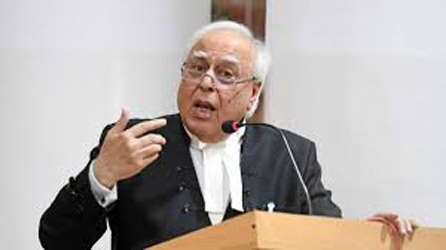NE NEWS SERVICE
NEW DELHI, FEB 19
Criticising the Union Budget, the Congress in Rajya Sabha attacked the government on Wednesday for not listening to “mann ki baat” of farmers protesting at Delhi’s borders, saying that their demand is MSP, which is a minimum thing that they are asking for, unlike big corporates.
Initiating a discussion on the General Budget, senior Congress leader Kapil Sibal warned that the agricultural reforms which the government is “experimenting” through the three new farm laws have already been experimented in America and Europe, which has resulted in corporatisation of farming.
He also said that the government, which has been saying that farmers would get more than MSP from private traders under the new laws, should not have a problem in giving a legal backing for minimum support price (MSP).
The government fixes the MSP for 22 crops but purchases only wheat, rice, and some pulses at this benchmark rate for food security purposes.
“The problem is you are not listening to ”mann ki baat” of farmers. You always talk about your ”mann ki baat”. What are farmers asking? Farmers are asking for MSP law…,” Sibal said in the upper house.
Noting that subsidies given to farmers are lower in India compared to China, the US, and Europe, he said, “In the US, every farmer gets from the government about the US $62,000 a year. You are not willing to give our farmers MSP. A farmer does not ask for more, your corporates do…”
When corporates ask for tax relief and exemptions, the government gives them.
“But when farmers ask for MSP, you are not ready to give. Poor farmers are asking minimum, you give maximum to corporates…,” he said.
India pays US $11 billion subsidies to farmers, while US $185.9 in China, 101.2 billion in Europe, and US $48.9 in the US, he added.
Expressing concern that the new farm laws would lead to corporatisation of Indian agriculture like in the US and Europe, Sibal said that farming was corporatised in America thinking it will benefit farmers and as a result, small farm lands have now disappeared and only 1.5 percent of the US population is into farming unlike 50 percent in India.
“In 2020, American farmers were saddled with the bankruptcy of over US $425 billion. This is the result of corporatisation of farming in America. In fact, the rate of suicides in rural America was 45 percent higher than in urban America. Small farmlands have disappeared,” he said.
Whereas in India, Sibal said about 40-50 percent are still dependent on agriculture for livelihood and have no alternative job, he said, adding there are no jobs available for them even if they want to give up farming selling their farmlands.
Thousands of farmers, especially from Punjab, Haryana, and parts of Uttar Pradesh are camping at Delhi borders for over two months seeking repeal of the three farm laws and legal guarantee of MSP of crops.
Eleven rounds of talks between the Centre and the protesting unions have failed to break the deadlock. The government has offered some concessions including suspension of the laws for 18 months, which farm unions have rejected. Meanwhile, on January 12, the Supreme Court stayed the implementation of the laws for two months and appointed a panel to look into the matter.
Terming that the Budget 2021 was a “jugglery of data”, Sibal said the government is “perpetuating a rigged economic system” besides doing a “loot bank politics” as more development works have been announced for poll-bound states of West Bengal, Assam and others.
While every budget has twin objectives of growth and equity, the government has preferred growth and forgotten the poor people of the country, while also promoting “crony capitalism”, he alleged.
“In 2018, one percent of people of this country owned 58 percent of the assets of this country. In 2019, one percent of people of this country owned 75 percent of the assets of this country… This is a classic case of crony capitalism,” he added.
Claiming that 4-5 big corporates own almost all assets in the country, Sibal, without naming anyone, said one big corporate is in all sectors from ports to airports to gas and railways. The projects are given to them overriding think-tank Niti Ayog and Finance Ministry’s objections.
Further, the Congress leader asked the government how will it spend on various programmes in the next fiscal when there is 23 percent drop in total tax receipts. And for 2021-22, the government has said tax revenue will increase by 14.9 percent to Rs 17.9 lakh crore which is lower than the budget estimate of 2020-21.
The government has projected this tax revenue increase against a backdrop of an expected increase in real GDP at 11 percent, which plunged to minus 7.7 percent in 2020-21, he said, adding that only time will show when this kind of growth will be achieved.
While the government is hoping to get revenue from achieving the disinvestment target of Rs 1.75 lakh crore in 2021-22 fiscal and thereby bring down the fiscal deficit to 6.8 percent, but the previous year”s achievement raises big doubt on accomplishing this target, he said.
Sibal attacked the government for poorly managing the economy before COVID-19 pandemic and during the pandemic as million suffered job loss and there was no mention of it in the Budget and even in the Economic Survey.












